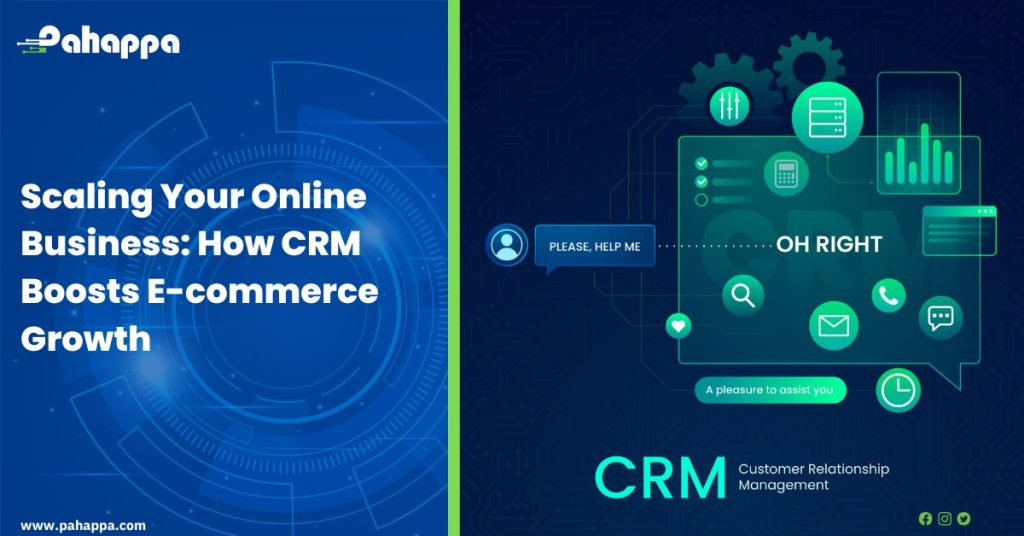Using a Customer Relationship Management (CRM) system in an e-commerce business can be highly beneficial for streamlining operations, improving customer relationships, and boosting overall growth. By effectively using a CRM in your e-commerce business, you can enhance customer engagement, optimize operations, and achieve sustainable growth. Make sure that your CRM system aligns with your business’s specific needs and objectives, and ensure that your team is trained to make the most of its features.
Here’s how you can effectively use a CRM in your e-commerce business:
1. Centralize Customer Data:
- Import and store customer data from various sources, including your e-commerce website, email lists, and social media.
- Create comprehensive customer profiles with information such as contact details, purchase history, preferences, and interaction history.
2. Segmentation:
- Segment your customer database based on various criteria, such as demographics, purchase behaviour, location, and engagement level.
- Use segmentation to target specific customer groups with personalized marketing campaigns.
3. Personalization:
- Leverage customer data to provide personalized shopping experiences, including product recommendations, personalized emails or SMSes, and content that matches individual preferences.
4. Marketing Automation:
- Set up automated email or SMS marketing campaigns triggered by customer actions like abandoned carts, product views, or previous purchases.
- Schedule and automate marketing communications to engage customers at various touchpoints in their buying journey.
5. Lead Management:
- Capture and track leads from various sources, such as contact forms, landing pages, and social media.
- Implement lead nurturing workflows to guide leads through the sales funnel and convert them into customers.
6. Order and Inventory Management:
- Integrate your CRM with your inventory and order management systems to maintain accurate product availability and streamline order processing.
7. Customer Support:
- Integrate customer support functionalities to provide efficient and personalized assistance.
- Log customer inquiries, track support tickets, and ensure timely issue resolution.
8. Multi-Channel Integration:
- Coordinate and manage multiple sales channels, such as your e-commerce website, social media, and marketplaces, through your CRM.
- Ensure a consistent customer experience across all channels.
9. Sales Funnel Optimization:
- Monitor customer interactions and purchase history to identify bottlenecks and optimize the sales funnel.
- Make data-driven improvements to increase conversion rates.
10. Analytics and Reporting:
- Utilize CRM analytics and reporting features to assess the performance of marketing campaigns, sales efforts, and customer service.
- Extract valuable insights to make informed business decisions.
11. Customer Loyalty and Retention:
- Identify loyal customers and offer them rewards through loyalty programs, discounts, or exclusive offers.
- Implement strategies to retain existing customers, which is often more cost-effective than acquiring new ones.
12. Scalability:
- Make sure your CRM system can grow with your e-commerce business. Ensure that it supports adding more users, features, and integrations as needed. This is why customised CRM systems are more beneficial.
13. Data Security and Compliance:
- Prioritize data security and compliance with data protection regulations to safeguard customer information and maintain trust.
14. Feedback Collection:
- Collect and analyze customer feedback to make improvements to your products, services, and overall customer experience.
15. Forecasting and Planning:
- Utilize historical data and CRM insights to forecast sales, inventory needs, and customer demand, which can inform your business planning.
Many businesses can benefit from using a CRM system. Among them is an e-commerce business. Because e-commerce businesses interact with clients daily, there is a need to track and monitor these customers and customer behaviour at given points in time. For an e-commerce business, it’s important to choose Customer Relationship Management (CRM) modules or features that cater specifically to the unique needs of online retail. Here are some essential CRM modules for an e-commerce business:
- Customer Information Management:
- Customer Profiling: Collect and centralize customer data, including contact information, purchase history, and demographic details.
- 360-Degree Customer View: Create comprehensive customer profiles to understand their preferences, behaviours, and interaction history.
- Order and Inventory Management:
- Order Tracking: Monitor order status and shipping information to keep customers informed.
- Inventory Integration: Integrate with inventory systems to ensure accurate product availability and manage stock levels effectively.
- Segmentation and Targeting:
- Customer Segmentation: Segment customers based on demographics, purchase history, location, and more.
- Targeted Marketing: Use segmentation to deliver personalized marketing campaigns and product recommendations.
- Marketing Automation:
- Email Campaigns: Set up automated email marketing campaigns for various customer actions.
- SMS Marketing: Send automated text messages to engage customers and promote special offers, abandoned carts, and product views
- Lead Management:
- Lead Capture: Capture leads from various sources, including your website, landing pages, and social media.
- Lead Nurturing: Implement workflows to guide leads through the sales funnel and convert them into customers.
- Multi-Channel Integration:
- Channel Management: Coordinate and manage sales across multiple channels, such as your e-commerce website, social media, marketplaces, and brick-and-mortar stores.
- Consistency: Ensure a consistent customer experience across all sales channels.
- Customer Support:
- Support Ticket Management: Integrate customer support functionalities to log customer inquiries and track support tickets.
- Resolution Tracking: Ensure timely resolution of customer issues, leading to higher customer satisfaction.
- Analytics and Reporting:
- Data Analytics: Use CRM analytics and reporting features to assess the performance of marketing campaigns, sales efforts, and customer service.
- Insight Extraction: Extract valuable insights from the data to make informed business decisions.
- Customer Loyalty and Retention:
- Loyalty Programs: Identify and reward loyal customers with loyalty programs, discounts, and exclusive offers.
- Retention Strategies: Implement strategies to retain existing customers, as they are often more cost-effective to retain than to acquire new ones.
- Feedback Collection:
- Customer Feedback: Collect and analyze customer feedback to make improvements to products, services, and the overall customer experience.
- Product Improvement: Use feedback to refine product offerings and enhance customer satisfaction.
- Scalability:
- Ensure the CRM system can scale with your e-commerce business by adding more users, features, and integrations as needed.
- Data Security and Compliance:
- Prioritize data security and compliance with data protection regulations to safeguard customer information and maintain trust.
- Forecasting and Planning:
- Utilize historical data and CRM insights to forecast sales, inventory needs, and customer demand, which can inform your business planning.
Having the perfect CRM systems that fit your goals as an e-commerce business makes it easier to monitor business growth. Scaling an online business can be a challenging endeavour, but a well-implemented Customer Relationship Management (CRM) system can significantly boost e-commerce growth. Here’s how a CRM can help:
- Customer Data Management: A CRM allows you to centralize and organize customer data, including contact information, purchase history, preferences, and interactions. With this data, you can better understand your customers’ needs and behaviour.
- Personalization: Using the customer data stored in your CRM, you can create highly personalized marketing campaigns, product recommendations, and content. This personalization can improve customer engagement and increase sales.
- Segmentation: CRM systems enable you to segment your customer base based on various criteria, such as demographics, purchase history, or location. This allows you to target specific groups with tailored marketing strategies.
- Lead Management: For e-commerce businesses, effectively managing leads and converting them into customers is crucial. A CRM helps automate lead capture and nurturing processes, making it easier to turn prospects into paying customers.
- Customer Service: A CRM can integrate with your customer support system, helping your team provide faster and more effective assistance to customers. Quick response times and issue resolution can lead to higher customer satisfaction and loyalty.
- Order Tracking and Inventory Management: Many CRMs integrate with inventory and order management systems. This helps you keep track of product availability and streamline order processing, reducing errors and improving the customer experience.
- Sales Funnel Optimization: By tracking customer interactions and purchase history, you can identify where customers drop off in your sales funnel. This data can be used to optimize your sales process and increase conversion rates.
- Marketing Automation: CRM systems often come with built-in marketing automation features. You can set up email marketing campaigns, SMS marketing, and other automated outreach to keep customers engaged and informed.
- Analytics and Reporting: CRM software provides valuable insights through data analytics and reporting features. You can monitor the performance of marketing campaigns, sales efforts, and customer service to make data-driven decisions.
- Customer Loyalty and Retention: A CRM helps you identify your most loyal customers and reward them through loyalty programs or special offers. Retaining existing customers is often more cost-effective than acquiring new ones.
- Multi-Channel Integration: Many e-commerce businesses sell through multiple channels, such as their website, social media, and marketplaces. A CRM can help you manage and coordinate these channels, ensuring a consistent customer experience.
- Scalability: As your e-commerce business grows, a CRM can scale with you. You can add more users, features, and integrations to accommodate your expanding needs.
- Forecasting and Planning: With historical data and analytics, a CRM can assist in forecasting sales, inventory needs, and customer demand. This helps you make more informed business decisions.
- Compliance and Data Security: E-commerce businesses often deal with sensitive customer information. A robust CRM system can help you ensure data security and compliance with data protection regulations.
In summary, implementing a CRM system in your e-commerce business can be a game-changer when it comes to scaling and achieving growth. It empowers you to better understand your customers, streamline operations, and deliver personalized experiences, ultimately leading to increased sales and customer loyalty. However, it’s essential to choose a CRM that aligns with your business’s specific needs and goals. To learn more about CRM systems, visit us here.











